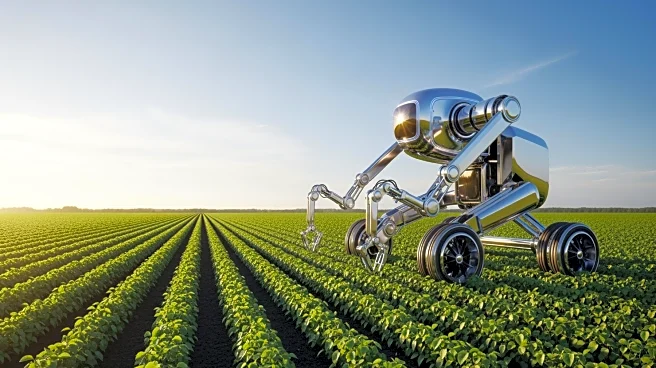What's Happening?
XMachines, an Indian company, is set to launch its new autonomous field robot, Neo, in December. Neo is a fully electric, multi-purpose robot designed to perform various farming tasks autonomously. It features a compact, tracked vehicle capable of spraying,
mowing, shallow tilling, seeding, and payload transport using modular attachments. The robot is primarily targeted at small to mid-sized farms aiming to boost productivity and reduce labor dependency. Neo is powered by a dual electric-motor drivetrain with torque vectoring, offering zero-turn maneuverability. It uses swappable 48V Li-ion batteries, providing 3 to 4 hours of operation per battery, with options for extended runtime. The robot's navigation is managed through RTK-GPS and AI vision, enabling real-time obstacle detection. Neo will be available for purchase at $19,995, with plans to deploy 250 units globally by the end of 2026.
Why It's Important?
The introduction of Neo represents a significant advancement in smart farming technology, offering a cost-effective solution for small to mid-sized farms. By automating labor-intensive tasks, Neo can help farmers reduce operational costs and increase efficiency. The robot's ability to perform multiple functions autonomously can lead to improved crop management and yield. Additionally, its electric design aligns with sustainable farming practices, reducing reliance on fossil fuels. The deployment of Neo in various countries, including the United States, indicates a growing trend towards adopting autonomous technology in agriculture, potentially transforming the industry and addressing labor shortages.
What's Next?
Following its launch, Neo will be available in several countries, including the United States, starting in 2026. XMachines aims to deploy at least 250 units globally by the end of 2026, which could lead to increased adoption of autonomous farming technology. The company may also explore further enhancements to Neo's capabilities and expand its market reach. As more farms integrate autonomous robots, stakeholders such as agricultural equipment manufacturers and technology developers may respond by investing in similar innovations, potentially accelerating the shift towards smart farming solutions.
Beyond the Headlines
The launch of Neo could have broader implications for the agricultural sector, including ethical considerations related to labor displacement and the environmental impact of increased automation. As farms transition to autonomous technology, there may be a need for new regulations and standards to ensure safe and effective operation. Additionally, the adoption of such technology could influence cultural perceptions of farming, shifting the focus from traditional methods to high-tech solutions.
















